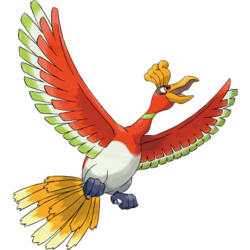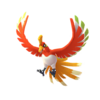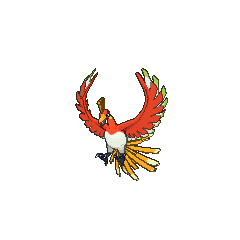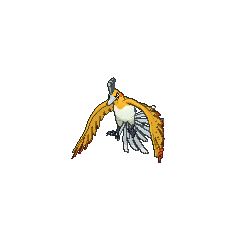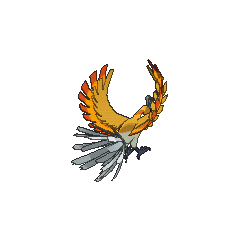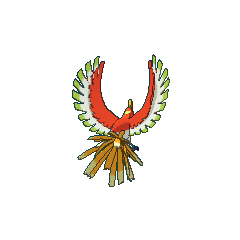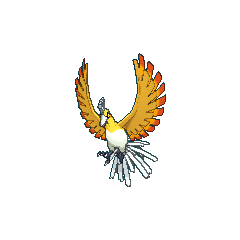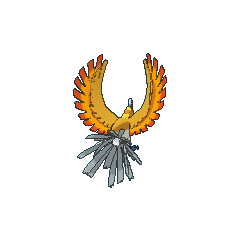Ho-Oh (Japanese: ホウオウ Houou) is a dual-type Fire/Flying Legendary Pokémon introduced in Generation II.
It is not known to evolve into or from any other Pokémon.
It is often considered to be closely related to Lugia as a duo, even sometimes as its polar opposite. Silver represents Lugia as "guardian of the seas", and Gold represents Ho-Oh as "guardian of the skies." Ho-Oh is also the trio master of the Legendary beasts.
Ho-Oh is the game mascot of Pokémon Gold and its remake Pokémon HeartGold, appearing on the boxart of both.
Biology
Ho-Oh is an avian Pokémon resembling a phoenix and a peacock. Its feathers are predominantly gold and red, with yellow tail-feathers, a white underside, and green feathers at the tip of its wings. Ho-Oh has a green stripe on its neck, a yellow beak, black rings around its red eyes, and a feathered, yellow crest on its head. Ho-Oh's wings are prismatic, causing it to trail a rainbow behind it. It has darkly colored feet and legs with four toes and long talons.
Ho-Oh has a mythical power to resurrect the dead. Ho-Oh was the only known Pokémon to learn Sacred Fire, its former signature move. It is said that when it flies its huge wings create bright, colorful rainbows. The rare few who bear witness to Ho-Oh are promised an eternal happiness. Ho-Oh used to perch at the top of the Bell Tower (or Tin Tower) until the Brass Tower was destroyed by fire. It now presumably flies through the world's skies in search of a Trainer with a pure heart.
In the anime
In the main series
According to the anime, Ho-Oh lived in the Tin Tower in ancient times. When a war broke out, burning both the Tin Tower and the Brass Tower down, it created Raikou, Entei, and Suicune, and all four disappeared. Later, a new Tin Tower was erected, but Ho-Oh since then has never come back for sure. A sacred flame from Ho-Oh burns in the Dragon's Den; it was obtained during the same war.
Major appearances
A Ho-Oh appeared to Ash at the end of the first episode, flying alongside a rainbow across the sky after the thunderstorm.
After competing in the Silver Conference, Ash saw Ho-Oh flying towards Hoenn. This encouraged him to get over his depression at his loss and continue his journey.
Ho-Oh was seen flying into the sunset at the end of Battling the Enemy Within!. This time, Brock, May, Max, Scott and Brandon saw Ho-Oh as well (on a slightly related note, this time, someone other than Ash managed to identify it first).
Minor appearances
A Ho-Oh appeared in a flashback during Pop Goes The Sneasel.
Ho-Oh had a cameo appearance in the opening sequences of Jirachi: Wish Maker, Lucario and the Mystery of Mew, The Rise of Darkrai, Arceus and the Jewel of Life, and Zoroark: Master of Illusions. In Lucario and the Mystery of Mew, Mew also transformed into Ho-Oh.
Pokédex entries
| Episode
|
Pokémon
|
Source
|
Entry
|
| EP001
|
Ho-Oh
|
Ash's Pokédex
|
There is no data. There are still Pokémon yet to be identified.
|
|
In Pokémon Generations
A wild Ho-Oh appeared in Ecruteak City in The Reawakening.
In the manga
In the Pokémon Adventures manga
In Pokémon Adventures, Ho-Oh first appeared as a silhouette in Just a Spearow Carrier. It appeared again as a silhouette in Hitmonlee, Baby! (One More Time), when Green was explaining to Bill that she believes the Elite Four were the ones who controlled it to capture her. It was used by the Masked Man to kidnap children showing remarkable talent in his scheme to capture Celebi, including Green and Silver, six years prior to the start of the entire manga. Prior to the events of the GSC saga, Pryce had lost his control over Ho-Oh, and thus attacked the Tin Tower using Team Rocket to prompt Ho-Oh to return to Ecruteak City. Ho-Oh was later seen at Indigo Plateau under Pryce's control, alongside Lugia, wreaking havoc and destruction. It was then lent to Karen and Will to fight Green with alongside Lugia, and nearly defeated her Legendary birds, but both of them were eventually brought back to their senses and freed.
In the Pokémon Gotta Catch 'Em All manga
Ho-Oh appeared in GDZ65.
In the Pokémon Pocket Monsters manga
Ho-Oh appeared in The Legendary Ho-oh!! and PMHGSS02.
In the TCG
- Main article: Ho-Oh (TCG)
In the TFG
One Ho-Oh figure has been released.
Other appearances
When released from a Poké Ball, Ho-Oh unleashes a spiral of Sacred Fire that deals massive amounts of damage to any opponent caught in it. However, it appears very rarely.
Melee trophy information
As it soars around the skies of the world, this Rainbow Pokemon leaves a trail of rainbows and myths in its wake. Its signature move is called Sacred Fire, and it is believed to appear only before trainers who are pure of heart. If you see a trainer with Ho-oh, you can assume that catching it took a lot of work.
Brawl trophy information
"A Rainbow Pokémon. On sparkling wings of seven colors, Ho-Oh leaves a rainbow behind as it flies. Legend says that Ho-Oh suppressed a war that scorched the land in ancient times. Its attack Sacred Fire can melt ice in an instant and also damage the target with burns. Ho-Oh will show its solemn figure only for the most righteous Trainers."
Ho-Oh returns as an occasional stage hazard in the Blazing Chamber of the Kalos Pokémon League stage. Rarely appearing, it makes the flames supporting the platforms flare up with higher intensity, likely KOing any characters unfortunate enough to be on the platforms at the time.
Trophy Information
This Pokémon flies through the skies, trailing rainbows from its wings, and is said to promise eternal happiness to all who see it. Supposedly, it appears every once in a while in the Fire-type Elite Four Trainer's room in the Kalos Pokémon League stage. Its screams cause pillars of fire to rise all the way to the ceiling.
Game data
Pokédex entries
| This Pokémon was unavailable prior to Generation II.
|
| Generation II
|
|
| Gold
|
Legends claim this Pokémon flies the world's skies continuously on its magnificent seven-colored wings.
|
| Silver
|
A legend says that its body glows in seven colors. A rainbow is said to form behind it when it flies.
|
| Crystal
|
It will reveal itself before a pure-hearted trainer by shining its bright rainbow-colored wings.
|
| Stadium 2
|
Legends claim this Pokémon flies the world's skies continuously on its magnificent seven-colored wings.
|
|
|
| Generation III
|
|
| Ruby
|
Ho-Oh's feathers glow in seven colors depending on the angle at which they are struck by light. These feathers are said to bring happiness to the bearers. This Pokémon is said to live at the foot of a rainbow.
|
| Sapphire
|
| Emerald
|
Its feathers—which glow in seven colors depending on the angle at which they are struck by light—are thought to bring joy. It is said to live at the foot of a rainbow.
|
| FireRed
|
A legend says that its body glows in seven colors. A rainbow is said to form behind it when it flies.
|
| LeafGreen
|
Legends claim this Pokémon flies the world's skies continuously on its magnificent seven-colored wings.
|
|
|
| Generation IV
|
|
| Diamond
|
It possesses seven-colored wings. It is said that those who see Ho-Oh are promised an eternal happiness.
|
| Pearl
|
| Platinum
|
| HeartGold
|
Legends claim this Pokémon flies the world's skies continuously on its magnificent seven-colored wings.
|
| SoulSilver
|
A legend says that its body glows in seven colors. A rainbow is said to form behind it when it flies.
|
|
|
| Generation V
|
|
| Black
|
It possesses seven-colored wings. It is said that those who see Ho-Oh are promised an eternal happiness.
|
| White
|
| Black 2
|
Its feathers are in seven colors. It is said that anyone seeing it is promised eternal happiness.
|
| White 2
|
|
|
| Generation VI
|
|
| X
|
A legend says that its body glows in seven colors. A rainbow is said to form behind it when it flies.
|
| Y
|
It will reveal itself before a pure-hearted Trainer by shining its bright, rainbow-colored wings.
|
| Omega Ruby
|
Ho-Oh's feathers glow in seven colors depending on the angle at which they are struck by light. These feathers are said to bring happiness to the bearers. This Pokémon is said to live at the foot of a rainbow.
|
| Alpha Sapphire
|
|
|
Game locations
| This Pokémon was unavailable prior to Generation II.
|
|
|
|
|
|
|
|
|
|
|
|
|
In side games
| This Pokémon was unavailable prior to Generation II.
|
| Generation II
|
|
| This Pokémon is unavailable in Generation II side games.
|
|
|
|
|
|
|
|
|
|
|
In events
| Games
|
Event
|
Language/Region
|
Location
|
Level
|
Distribution period
|
| GSC
|
Gotta Catch 'Em All Station! Ho-Oh
|
English
|
United States
|
40
|
November 15 to 21, 2002;
December 6 to 12, 2002
|
| RSEFRLG
|
Top Ten Distribution Ho-Oh
|
English
|
United Kingdom
|
70
|
June 10, 2006;
October 14 to November 19, 2006
|
| RSEFRLG
|
Top Ten Distribution Ho-Oh
|
Italian
|
Italy
|
70
|
June 23 to 25, 2006
|
| RSEFRLG
|
Top Ten Distribution Ho-Oh
|
Spanish
|
Spain
|
70
|
June 27 to August 27, 2006
|
| RSEFRLG
|
Top Ten Distribution Ho-Oh
|
German
|
Germany
|
70
|
September 24 to November 5, 2006
|
| RSEFRLG
|
Top Ten Distribution Ho-Oh
|
French
|
France
|
70
|
September 26, 2006
|
| ORAS
|
Pokémon Center Kyoto Ho-Oh
|
All
|
Japan
|
50
|
March 15, 2016
March 16 to May 8, 2016
|
| SM
|
Mount Tensei Ho-Oh
|
Japanese region
|
Online
|
100
|
July 15 to September 14, 2017
|
Held items
Stats
Base stats
| Stat
|
Range
|
| At Lv. 50
|
At Lv. 100
|
106
|
|
166 - 213
|
322 - 416
|
130
|
|
121 - 200
|
238 - 394
|
90
|
|
85 - 156
|
166 - 306
|
110
|
|
103 - 178
|
202 - 350
|
154
|
|
143 - 226
|
281 - 447
|
90
|
|
85 - 156
|
166 - 306
|
Total: 680
|
Other Pokémon with this total
|
- Minimum stats are calculated with 0 EVs, IVs of 0, and (if applicable) a hindering nature.
- Maximum stats are calculated with 252 EVs, IVs of 31, and (if applicable) a helpful nature.
|
Pokéathlon stats
Type effectiveness
| Under normal battle conditions in Generation IX, this Pokémon is:
|
|
|
|
|
|
|
|
|
|
|
|
|
Learnset
|
|
|
|
- Bold indicates a move that gets STAB when used by Ho-Oh
- Italic indicates a move that gets STAB only when used by an Evolution of Ho-Oh
- Click on the generation numbers at the top to see level-up moves from other generations
|
|
|
|
|
- Bold indicates a move that gets STAB when used by Ho-Oh
- Italic indicates a move that gets STAB only when used by an Evolution of Ho-Oh
- Click on the generation numbers at the top to see TM moves from other generations
|
|
|
|
|
- Moves marked with an asterisk (*) must be chain bred onto Ho-Oh in Generation VII
- Moves marked with a double dagger (‡) can only be bred from a Pokémon who learned the move in an earlier generation.
- Moves marked with a superscript game abbreviation can only be bred onto Ho-Oh in that game.
- Bold indicates a move that gets STAB when used by Ho-Oh
- Italic indicates a move that gets STAB only when used by an Evolution of Ho-Oh
- Click on the generation numbers at the top to see Egg moves from other generations
|
|
|
|
|
- A black or white abbreviation in a colored box indicates that Ho-Oh can be tutored the move in that game
- A colored abbreviation in a white box indicates that Ho-Oh cannot be tutored the move in that game
- Bold indicates a move that gets STAB when used by Ho-Oh
- Italic indicates a move that gets STAB only when used by an Evolution of Ho-Oh
- Click on the generation numbers at the top to see Move Tutor moves from other generations
|
Side game data
Evolution
Sprites
| This Pokémon was unavailable prior to Generation II.
|
|
|
|
|
|
|
|
|
|
|
|
|
Trivia
Origin
Ho-Oh may be based on the legend of the phoenix, specifically the Fenghuang, the immortal phoenix of China from which it derives its name. It may also based on the Huma bird, a Legendary bird that is said to never rest, living its entire life flying continuously, and resurrects itself and others in its own ashes and flames. It is a symbol of fortune and friendship and will bestow happiness to anyone who simply glimpses it. Many cultures view the Phoenix and Huma as symbols of resurrection; this is seen in Ho-Oh, which was reborn rising from its own ashes and had a hand in resurrecting Suicune, Raikou and Entei. It may also be based on many other firebirds; some examples are the three-legged bird, Simurgh, and the Ember Bird. It also is similar to the rainbow-feathered bird god Achiyalabopa.
Name origin
Ho-Oh and Houou are alternate transcriptions of the Chinese bird known as the 鳳凰 Hōō (or Fènghuáng in Chinese pinyin). The ou may also refer to 皇 ō (emperor, can also be read as kō) or 王 ō (king).
In other languages
|
|
| More languages
|
 Hindi Hindi
|
हो-ओह Ho-oh
|
Transcription of English name
|
 Russian Russian
|
Хо-Ох Kho-Okh
|
Transcription of English name
|
|
|
|
Related articles
External links

|
This Pokémon article is part of Project Pokédex, a Bulbapedia project that aims to write comprehensive articles on each Pokémon species, as well as Pokémon groups and forms.
|

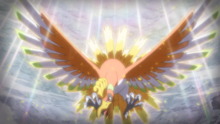
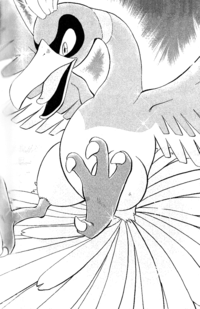

 For other sprites and images, please see Ho-Oh images on the Bulbagarden Archives.
For other sprites and images, please see Ho-Oh images on the Bulbagarden Archives.
